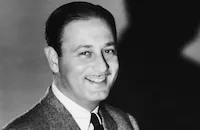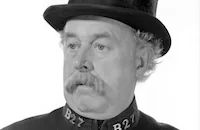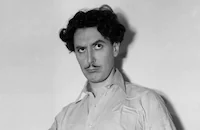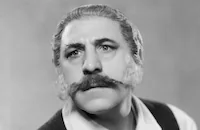Everybody Sing

Brief Synopsis
Cast & Crew
Edwin L. Marin
Allan Jones
Judy Garland
Fanny Brice
Reginald Owen
Billie Burke
Film Details
Technical Specs

Synopsis
After being expelled from the exclusive Colvin School for Girls for singing Mendelssohn in swing time, Judy Bellaire must go home and face her family. Although eccentricity is a family trademark, Judy's father Hillary and mother Diana are distressed that she has gotten expelled again. Only the family servants, Olga Chekaloff and Ricky Saboni, and her sister Sylvia seem to sympathize. Playwright Hillary is too busy rehearsing his new play starring Diana and Jerrold Hope, as well as coping with the family's strained finances, to listen to Judy. When backer John Fleming finally decides that he has had enough of the Bellaires and won't finance the play, Judy thinks that she can save them by performing herself. Although Ricky is a successful singer each night at the Cafe Nappo, he stays with the Bellaires to be near Sylvia, who returns his affection. During the various family crises, Judy is put on a boat to Europe to prevent her from taking a job singing at the Cafe Neppo, but she sneaks away and becomes a sensation, unknown to her self-absorbed parents. To further help the Bellaires, Ricky talks his boss at the Cafe, Signor Giovanni Vittorino, into backing a show starring himself and Judy. Meanwhile, because Jerrold has threatened to quit Hillary's play, Sylvia promises to marry him. Heartbroken, she sends Olga out with a message for Ricky, but Olga loses it and forgets all about it when she is given a part in the show. As opening night for Hillary's play approaches, a child welfare agent attempts to stop Judy from appearing in the play because she is under age, but Olga has the man arrested as a kidnapper. discovering finally that Judy is not in Europe and fearing that she really has been kidnapped, they go to the police station, where they learn that she is appearing in Ricky's play. They go to the theater to stop her, but seeing her perform, they realize that the stage is where she belongs. Finally, the play is a success, Ricky and Sylvia are reunited and Olga chases after her long-lost love Boris, who is now driving a taxi.

Director

Edwin L. Marin
Cast

Allan Jones

Judy Garland

Fanny Brice

Reginald Owen

Billie Burke

Reginald Gardiner

Lynn Carver
Helen Troy

Monty Woolley
Adia Kuznetzoff

Henry Armetta
Michelette Burani
Mary Forbes
Ed Dearing
Ann Bupp
St. Brendan's Boys Choir
Crew
Dr. William Axt
George Bassman
Iola Cochran
Joe Cooke
John Detlie
Roger Edens
Seymour Felix
Cedric Gibbons
Bill Ginn
Dave Gould
William S. Gray
James Gruen
Walter Jurman
Gus Kahn
Bert Kalmar
Bert Kalmar
Bronislaw Kaper
Millard Kaufman
Fred Lane
Harry Mcafee
Milton Merlin
Robert Mitchell
Harry Rapf
Val Raset
Mildred Rogers
Sandy Roth
Harry Ruby
Harry Ruby
Joseph Ruttenberg
Florence Ryerson
Douglas Shearer
Georgie Stoll
Edwin B. Willis
Edgar Allan Woolf

Videos
Movie Clip



Trailer
Film Details
Technical Specs

Articles
Everybody Sing
Lynne Carver plays Judy's fetching older sister, with Reginald Owen as their father, Allan Jones as the family chauffeur and Reginald Gardiner as Burke's long-suffering leading man. In a rare movie role, legendary comedienne Fannie Brice plays the family's Russian maid, performing "Quainty, Dainty Me" and, with Garland, a number based on Brice's "Baby Snooks" character. In addition to "Swing Mr. Mendellsohn," Garland sings "Down on Melody Farm," "Ever Since the World Began" and, in blackface, "Swing Low, Sweet Chariot." Jones, MGM's resident tenor, handles "The One I Love," "The Show Must Go On" and several other tunes.
While Everybody Sing marked progress in Garland's budding career at MGM, offering her five musical numbers and equal billing with the firmly established Brice and Jones, the studio known for its glamorous stars still seemed uncertain of their new player's appeal. The movie's original title had been The Ugly Duckling, and ads for the completed film invited audiences to "Get an eyeful of lovely Lynne Carver, MGM's new glamour girl!" Garland stole the notices, however, with Film Weekly declaring that her singing lifted the movie into the "excellent" class and further stating that "Anyone who stands up to Miss Brice at her own comedy game is very good indeed."
As important as the film itself in the development of Garland's career was a seven-week, seven-city promotional tour that started in Miami Beach and included stops in New York and Chicago. With Garland mentor Roger Edens accompanying her on the piano, she stepped alone for the first time onto huge stages to sing in front of adoring crowds and began to establish the audience rapport that would, in time, make her one the world's greatest live entertainers.
Producer: Harry Rapf
Director: Edwin L. Marin
Screenplay: Florence Ryerson, Edgar Allan Woolf, James Gruen
Cinematography: Joseph Ruttenberg
Art Direction: Cedric Gibbons
Original Music: Walter Jurmann, Bert Kalmar, Bronislau Kaper, Harry Ruby, Roger Edens (uncredited)
Editing: William S. Gray
Principal Cast: Allan Jones (Richard "Ricky" Saboni), Judy Garland (Judy Bellaire), Fanny Brice (Olga Chekaloff), Reginald Owen (Hillary Bellaire), Billie Burke (Diana Bellaire), Reginald Gardiner (Jerrold Hope), Lynne Carver (Sylvia Bellaire), Monty Wooley (John "Jack" Fleming).
BW-92m. Closed captioning.
by Roger Fristoe

Everybody Sing
Quotes
Trivia
Notes
Pre-release titles of the film were The Ugly Duckling and Swing Fever. The writing credits for Milton Merlin, Bert Kalmer, Harry Ruby and Dalton Trumbo were tentative only according to Screen Achievements Bulletin records contained in the AMPAS library file on the film, and were not recorded in the final records of Screen Achievements Bulletin. The extent of Merlin's contributions to the film are unknown, however, Kalmar and Ruby's work was most likely the special lyrics used by Fanny Brice in her "Snooks" number. According to a news item in Hollywood Reporter, Trumbo was working on "polishing" the script just prior to production. Another Hollywood Reporter news item noted that this was Monty Woolley's first film under contract to M-G-M. Although reviews based on various previews listed a running time of 80 min., Motion Picture Herald release charts and Motion Picture Almanac listed the release time as 91 min. Brice's "Snooks" number was based on the popular Broadway and radio character she portrayed, "Baby Snooks."















